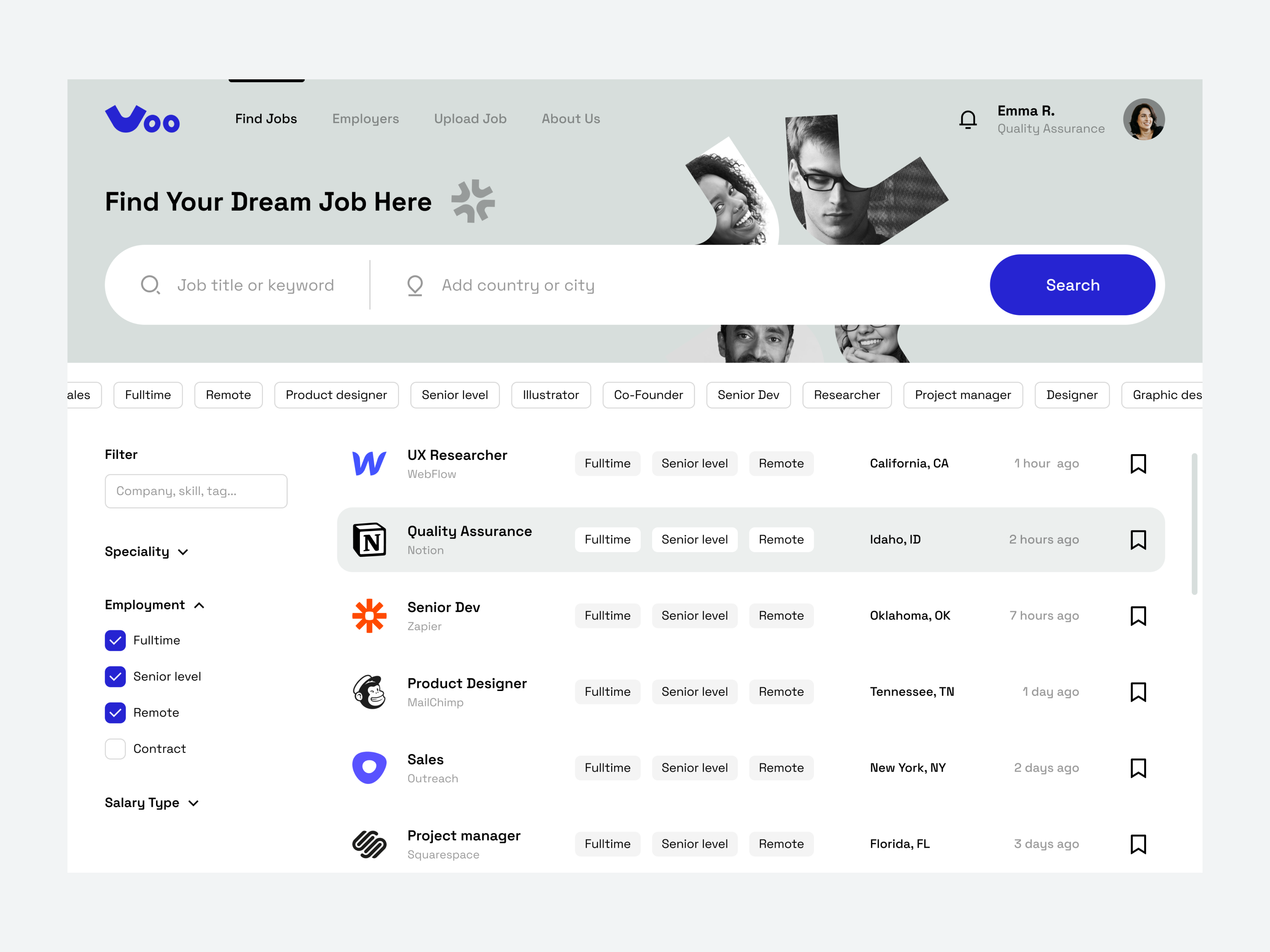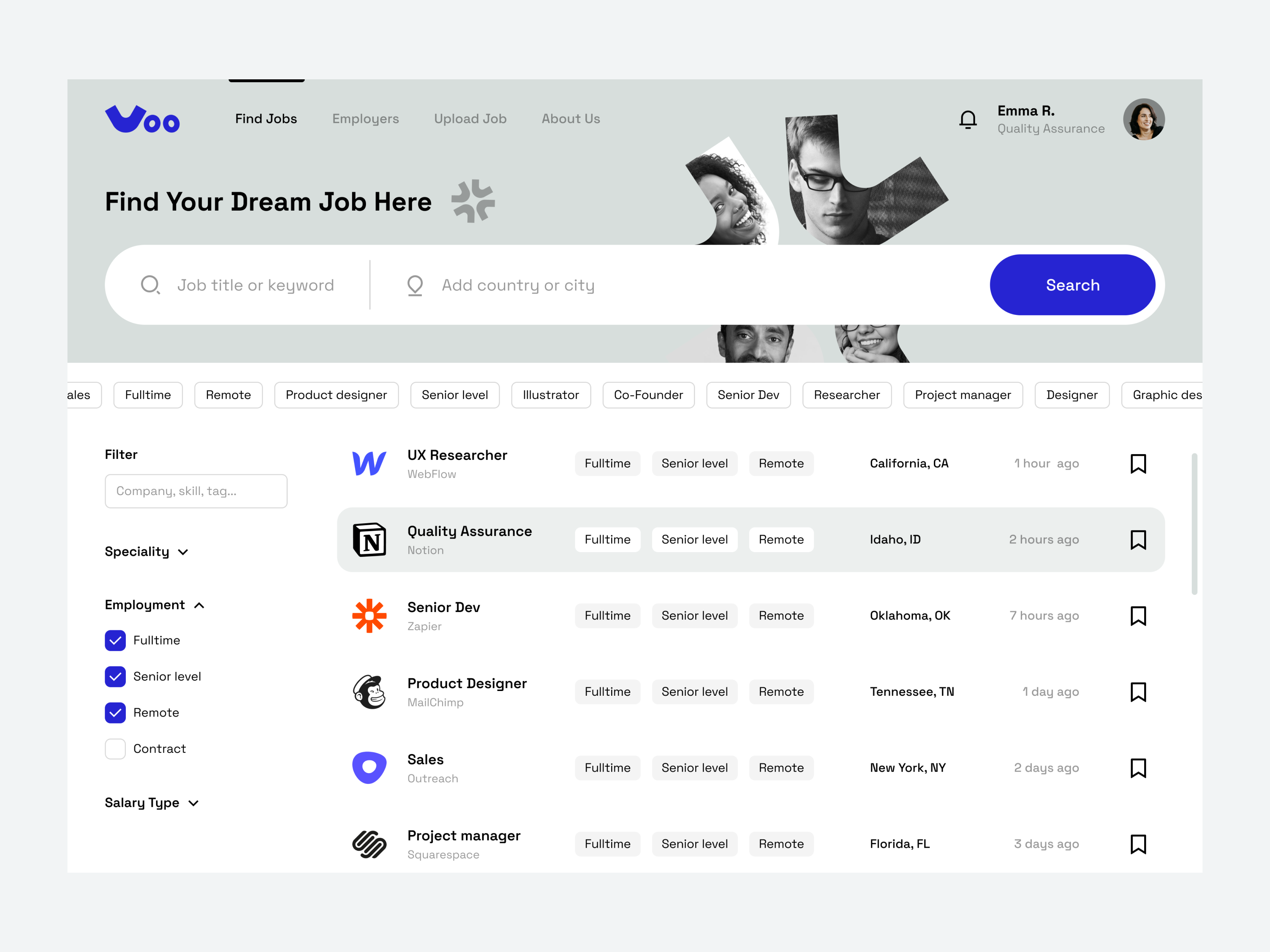Table of Contents
The world of work is undergoing a seismic shift as the gig economy continues to gain prominence. Freelancers, independent contractors, and gig workers now constitute a significant portion of the workforce. In this landscape, job-search platforms are evolving to cater to the unique needs and preferences of this growing segment. This article explores how job-search platforms are adapting to the gig economy and assisting freelancers and contractors in finding rewarding opportunities.
The world of work is undergoing a seismic shift as the gig economy continues to gain prominence. Freelancers, independent contractors, and gig workers now constitute a significant and dynamic portion of the workforce. In this rapidly evolving landscape, job-search platforms are stepping up to cater to the unique needs and preferences of this growing segment, recognizing that the traditional job search model may not fully address their requirements.
One of the most notable adaptations in job-search platforms is the recognition of the diversity of work arrangements within the gig economy. These platforms are no longer solely focused on full-time, permanent positions. Instead, they are diversifying their offerings to include short-term contracts, freelance gigs, project-based work, and even the burgeoning world of remote work. This adaptability reflects the fluid nature of gig work and empowers individuals to find opportunities that align with their specific skill sets and availability.
Furthermore, job-search platforms are integrating features that enable gig workers to showcase their portfolios, skills, and track records in a more prominent manner. For freelancers and independent contractors, this means having the ability to present a comprehensive picture of their capabilities to potential clients or employers. This shift from a traditional résumé-based approach to a more holistic and dynamic profile allows gig workers to stand out in a competitive marketplace.
Moreover, job-search platforms are increasingly incorporating tools to facilitate secure and efficient payments for gig workers. Timely and transparent compensation is a critical concern for those in the gig economy, and platforms are responding by providing escrow services, invoicing tools, and even integrated payment processing systems to ensure that freelancers and contractors receive fair compensation for their work.
The gig economy is also marked by its global nature, and job-search platforms are leveraging technology to facilitate cross-border opportunities. Freelancers can now explore work from clients and businesses worldwide, transcending geographical limitations and expanding their horizons.
Lastly, job-search platforms are prioritizing flexibility and adaptability in their user interfaces and algorithms. They are becoming more intuitive in matching gig workers with projects and clients that align not only with their skills but also with their preferences and availability. This personalized approach enhances the overall user experience and helps gig workers find opportunities that suit their unique circumstances.
In conclusion, the gig economy has ushered in a new era of work, and job-search platforms are evolving in tandem to support the diverse needs of gig workers. By diversifying their offerings, enhancing profile features, streamlining payments, facilitating global opportunities, and embracing flexibility, these platforms are playing a pivotal role in helping freelancers and contractors find rewarding and fulfilling opportunities in this ever-changing world of work.
You can also read more about this here: (PDF) Human Resource Management and the Gig Economy …
The Gig Economy Landscape
The gig economy is characterized by the prevalence of short-term, project-based work arrangements. Freelancers and independent contractors offer their services on a project-by-project basis, enjoying flexibility in their work hours and the projects they take on. This shift away from traditional 9-to-5 employment has reshaped the job market, giving rise to new challenges and opportunities.
nullShould you desire more in-depth information, it’s available for your perusal on this page: Navigating the Gig Economy: Strategies for Freelancers …

Job-Search Platforms as Gig Marketplaces
Job-search platforms have embraced the gig economy by transforming themselves into dynamic marketplaces for short-term work. These platforms now host a wide range of gig opportunities across various industries, connecting freelancers and contractors with potential clients or employers.
Job-search platforms have not only evolved but have actively embraced the gig economy, marking a significant shift in the way people find and engage in work. These platforms have transformed themselves into dynamic marketplaces that cater to the growing demand for short-term, project-based employment opportunities. As a result, they have become the go-to hubs for individuals seeking gig work and companies looking to tap into the flexible talent pool.
Here’s how job-search platforms have adapted to the gig economy and what it means for the workforce and businesses:
Diverse Gig Opportunities: Job-search platforms have diversified their offerings to accommodate a wide range of gig opportunities. From creative freelancers and software developers to marketing consultants and delivery drivers, these platforms now host a plethora of gigs spanning various industries and skill sets. This diversity provides individuals with the flexibility to explore multiple gig roles or specialize in their chosen niche.
Flexible Work Arrangements: Gig workers value flexibility, and job-search platforms cater to this preference by enabling freelancers to choose the projects and clients they want to work with. They can set their own schedules, decide on the scope of work, and negotiate terms, empowering them to maintain a work-life balance that suits their needs.
Access to Global Talent: For businesses, job-search platforms offer a gateway to a global talent pool. Companies can tap into a diverse range of skills and expertise without geographical limitations. This access to a vast network of freelancers allows businesses to quickly scale up or down based on project demands.
Cost Efficiency: Gig work often proves to be a cost-effective solution for businesses. They can engage freelancers for specific projects, reducing overhead costs associated with full-time employees. This scalability ensures that businesses can remain agile in response to market fluctuations.
Skill Matching: Job-search platforms leverage advanced algorithms to match freelancers with projects that align with their skills and experience. This not only benefits gig workers by connecting them with suitable opportunities but also aids businesses in finding the right talent for their projects.
Reviews and Ratings: These platforms typically incorporate review and rating systems, which help both freelancers and businesses build their reputations. Positive feedback and high ratings boost a freelancer’s credibility and make them more attractive to potential clients. Conversely, businesses with a strong track record attract top-tier talent.
Income Diversification: Gig work can offer individuals the opportunity to diversify their income streams. Freelancers can take on multiple projects simultaneously, explore different niches, and build a portfolio of clients, reducing their reliance on a single source of income.
Market Insights: The data generated on these platforms provide valuable insights into labor market trends. This data can help businesses make informed decisions about their hiring strategies, such as which skills are in high demand and what competitive rates should be offered.
The transformation of job-search platforms into thriving gig marketplaces has reshaped the way people work and businesses operate. It reflects the increasing desire for flexibility in employment arrangements and the recognition that the gig economy is here to stay. As these platforms continue to evolve, they are likely to play an even more integral role in connecting individuals with gig opportunities and helping businesses access the right talent when they need it most.
For additional details, consider exploring the related content available here Freelance work, side hustles, and the gig economy | McKinsey

Profile Customization
To cater to the diverse talents and skills of gig workers, job-search platforms enable users to create customized profiles that highlight their expertise and experiences. These profiles serve as digital resumes, allowing freelancers and contractors to showcase their capabilities to potential clients.
In the gig economy, where talents and skills vary widely, job-search platforms are adapting to provide freelancers and independent contractors with the tools they need to stand out in a competitive market. One such tool is the ability to create highly customized profiles that function as digital resumes. These profiles serve as dynamic showcases of a worker’s expertise, experiences, and personal brand.
Customized profiles offer gig workers the flexibility to present themselves in a way that traditional resumes cannot. They can include multimedia elements such as videos, portfolio samples, and links to personal websites or blogs. This multimedia approach allows gig workers to demonstrate their skills in action, making it easier for potential clients to gauge their suitability for a project.
Furthermore, these profiles enable gig workers to emphasize their niche talents and unique selling points. Whether it’s a specific coding language, design style, or project management methodology, individuals can tailor their profiles to highlight the skills that make them stand out in their field. This level of personalization helps freelancers and contractors attract clients who are specifically seeking their expertise.
Additionally, these digital resumes offer a real-time snapshot of a worker’s availability and recent work history. Clients can see at a glance whether a gig worker is currently open for new projects and review their most recent accomplishments. This transparency can lead to faster, more efficient hiring decisions.
For gig workers, the ability to create customized profiles not only enhances their chances of landing relevant projects but also contributes to building a personal brand. As they accumulate positive reviews and ratings from satisfied clients, their profiles can become powerful marketing tools. A strong online presence can lead to a steady stream of new opportunities and long-term client relationships.
In conclusion, the use of customized profiles as digital resumes on job-search platforms empowers gig workers to better showcase their skills and experiences. These profiles offer a multimedia, dynamic, and personalized way to present one’s talents, helping freelancers and contractors connect with clients seeking their unique expertise. As the gig economy continues to grow, the importance of these customized profiles in shaping a successful freelance career cannot be overstated.
For additional details, consider exploring the related content available here Effects of Standardization versus Personalization on Job Acquisition …

Project Matching
One of the key features of modern job-search platforms is their ability to match freelancers with relevant projects. Algorithms analyze profiles and job requirements to suggest suitable matches, streamlining the process of finding gigs. This saves both time and effort for gig workers.
The advent of modern job-search platforms has ushered in a new era of efficiency and convenience for gig workers, thanks to their powerful matching capabilities. These platforms employ sophisticated algorithms that dive deep into the profiles of freelancers and the requirements of available projects, and the implications of this go well beyond mere convenience.
Enhanced Personalization: AI-powered algorithms take into account not only the skills and experiences listed on a freelancer’s profile but also their work history, feedback from previous clients, and even their preferences. This level of personalization ensures that gig workers are not just matched with any project but with ones that align with their expertise and career aspirations. It’s a bit like having a personal job agent working around the clock to find the perfect gigs.
Minimized Job Search Fatigue: For freelancers, constantly scouring job listings and sending out applications can be time-consuming and mentally draining. Modern job-search platforms ease this burden by sending notifications about relevant projects directly to freelancers. This proactive approach not only saves time but also reduces the risk of missing out on promising opportunities.
Skill Development Guidance: By analyzing a freelancer’s skill set and the types of projects they’ve completed, these platforms can provide recommendations for skill development. This guidance helps gig workers stay competitive in their fields and expand their professional horizons.
Quality Assurance: On the client side, these platforms contribute to a higher quality of work by suggesting freelancers who are not only qualified but also a good fit for the project in terms of communication style and work culture compatibility. This reduces the likelihood of mismatches and conflicts during project execution.
Market Insights: The data generated by these matching algorithms also provides valuable insights into market trends. For example, it can highlight the demand for specific skills, the rates being offered for certain types of projects, and geographic preferences. This information can be invaluable for freelancers looking to optimize their offerings and for clients seeking to understand the competitive landscape.
Diversity and Inclusion: Modern job-search platforms have the potential to promote diversity and inclusion by matching gig workers with projects that value a variety of backgrounds and perspectives. Algorithms can be designed to recognize and prioritize diversity, thus contributing to more inclusive work environments.
Economic Growth: By connecting freelancers with more suitable projects, these platforms contribute to economic growth. Gig workers are more likely to be productive and satisfied when working on projects that align with their skills and interests, ultimately driving innovation and economic prosperity.
In sum, the ability of modern job-search platforms to match freelancers with relevant projects is not merely a matter of convenience; it’s a game-changer for both gig workers and the broader job market. These platforms leverage the power of AI and data analysis to create meaningful, tailored connections that save time, foster professional growth, and contribute to economic vitality. As technology continues to advance, the impact of these platforms is likely to grow, reshaping the way we work and connect in the gig economy.
For a comprehensive look at this subject, we invite you to read more on this dedicated page: Freelance work, side hustles, and the gig economy | McKinsey

Bidding and Proposal Systems
Many job-search platforms incorporate bidding or proposal systems that empower freelancers and contractors to actively seek out projects. They can submit proposals outlining their qualifications and pricing, enabling them to compete for projects that align with their expertise and financial goals.
nullExplore this link for a more extensive examination of the topic: Online platforms: Economic and societal effects

Freelancer Ratings and Reviews
To foster trust and transparency in the gig economy, job-search platforms often include rating and review systems. Clients can provide feedback on freelancers’ performance, allowing future employers to make informed decisions when selecting gig workers. Positive reviews can help freelancers build their reputations and secure more opportunities.
To foster trust and transparency in the gig economy, job-search platforms often include rating and review systems. These systems serve as a crucial mechanism for both clients and freelancers to evaluate and establish trust in their professional interactions.
For clients, the ability to provide feedback on freelancers’ performance is a valuable tool. It allows them to share their experiences, highlight exceptional work, and raise any concerns they may have. This not only serves as a means of quality control but also empowers clients to make more informed decisions when selecting gig workers. By reading reviews and assessing ratings, clients can gauge the reliability, professionalism, and skills of freelancers, ensuring that their project or task is entrusted to capable hands.
On the flip side, freelancers benefit immensely from these rating and review systems as well. Positive reviews and high ratings act as virtual endorsements of their work. A track record of excellent performance and satisfied clients helps freelancers build and reinforce their reputations within the gig economy. It becomes a testament to their expertise and reliability, setting them apart in a competitive marketplace.
Moreover, positive reviews can be a significant factor in securing more opportunities. Clients are more likely to choose freelancers with a proven history of delivering quality work and exceeding expectations. As freelancers accumulate positive feedback, they can command higher rates for their services and enjoy a more steady stream of work. This not only enhances their income potential but also provides a sense of professional satisfaction and security.
However, the system’s effectiveness relies on its fairness and authenticity. Job-search platforms must implement measures to prevent fake reviews and ensure that feedback accurately reflects the freelancers’ performance. Additionally, platforms can offer dispute resolution mechanisms to address any discrepancies between clients and freelancers, fostering a sense of fairness and trust in the system.
In conclusion, rating and review systems in the gig economy play a pivotal role in establishing trust and transparency among clients and freelancers. They empower clients to make informed decisions, encourage freelancers to maintain high standards, and ultimately contribute to the overall quality and professionalism within the gig economy. When executed effectively, these systems create a win-win situation, benefiting both sides of the gig work equation and promoting a thriving and trustworthy ecosystem for freelance professionals and their clients.
To expand your knowledge on this subject, make sure to read on at this location: Gig Economy: Definition, Factors Behind It, Critique & Gig Work

Payment Processing
Payment processing is a critical aspect of gig work. Job-search platforms often facilitate secure payment transactions, ensuring that freelancers receive timely compensation for their services. This eliminates payment hassles and disputes.
Payment processing, as a fundamental pillar of the gig economy, plays a multifaceted role in shaping the experience of both gig workers and their clients. Beyond the immediate benefits of secure and hassle-free transactions, it contributes to the overall stability and growth of the gig economy in several ways:
Financial Inclusion: Payment processing platforms enable individuals from diverse backgrounds to participate in the gig economy. This inclusivity is crucial for economic empowerment, as it allows people to leverage their skills and resources to generate income, even if they lack access to traditional employment opportunities.
Risk Mitigation: These platforms often offer escrow services, holding the payment from the client until the gig is completed satisfactorily. This protects both parties from potential fraud or non-payment issues, instilling trust in the system and fostering a sense of security among gig workers.
Streamlined Taxation: Payment processors can assist gig workers in managing their tax obligations. They may provide tools for tracking earnings and automatically withholding taxes, simplifying the often complex process of self-employment tax compliance.
Facilitating Global Workforce: Payment processing transcends geographical boundaries, allowing freelancers to work with clients from around the world. This globalization of the gig economy not only broadens opportunities for gig workers but also enables businesses to access a diverse pool of talent.
Building Reputations: Consistent and timely payments contribute to the reputation of both gig workers and clients on job-search platforms. Reliable payment processing fosters trust and encourages repeat business and long-term collaborations.
Innovation in Financial Services: Payment processors are driving innovation in financial services tailored to gig workers. This includes features like instant payouts, financial planning tools, and access to credit, which can help freelancers better manage their finances and plan for the future.
Economic Resilience: In uncertain economic times, the gig economy can provide a safety net for individuals facing job loss or financial instability. Reliable payment processing ensures that gig workers can quickly access their earnings, helping them weather financial challenges.
Marketplace Growth: As the gig economy expands, the demand for efficient payment processing solutions grows in tandem. This drives competition among payment processors, leading to continuous improvements in speed, security, and cost-effectiveness.
Data Insights: Payment processing platforms gather valuable data on gig work trends, including demand for specific skills, pricing models, and regional variations. This data can be used to inform workforce development initiatives and government policies.
Emergence of New Business Models: The success of payment processing in the gig economy has led to the emergence of new business models, including platforms that cater exclusively to gig workers, offering tailored financial services and benefits.
In essence, payment processing in the gig economy transcends its role as a simple transaction facilitator. It underpins the entire ecosystem, enabling freelancers to access opportunities, build their reputations, and secure their financial well-being. As this sector continues to evolve, payment processing will likely remain at the forefront of innovation, playing a pivotal role in shaping the future of work.
If you’d like to dive deeper into this subject, there’s more to discover on this page: Freelance Workers | DCWP

Skill Development and Resources
Recognizing that gig workers frequently seek opportunities for skill development, some job-search platforms offer resources such as online courses, webinars, and tutorials. These resources enable freelancers and contractors to enhance their skill sets and remain competitive in the gig economy.
In the dynamic landscape of the gig economy, job-search platforms have evolved to cater to the ever-growing demand for skill development among gig workers. Acknowledging that many freelancers and contractors are motivated not only by immediate earnings but also by the desire to enhance their professional competencies, these platforms have become more than just job listings. They now serve as holistic career development hubs.
One significant way these platforms empower gig workers is by providing a wide array of educational resources. These resources go beyond traditional job listings and encompass online courses, webinars, tutorials, and even access to industry experts. This rich tapestry of learning opportunities allows gig workers to upskill and reskill conveniently and at their own pace.
Online courses offered through these platforms cover a spectrum of subjects, from technical skills to soft skills like communication and project management. These courses often come with certifications that can boost a gig worker’s credibility and marketability. The flexibility of online learning aligns perfectly with the gig worker’s lifestyle, enabling them to balance work, education, and personal life effectively.
Webinars and tutorials serve as valuable tools for staying updated with industry trends and best practices. They provide a platform for gig workers to engage with experts, ask questions, and network with peers, fostering a sense of community and continuous learning. This not only enhances their skills but also keeps them informed about the latest market demands and opportunities.
Furthermore, the availability of these resources helps gig workers remain competitive in a fast-changing job market. By investing in their skill development, they can take on more diverse and high-paying gigs. Additionally, clients and employers often prioritize gig workers who demonstrate a commitment to self-improvement and staying up-to-date with industry advancements.
In conclusion, the shift from job-search platforms to comprehensive career development platforms has been a game-changer for gig workers. These platforms recognize that skill development is a key motivator and offer a plethora of resources to help gig workers enhance their competencies. This not only benefits individual gig workers but also contributes to the overall growth and adaptability of the gig economy as a whole. As the gig economy continues to evolve, these platforms will play an increasingly vital role in shaping the future of work.
For a comprehensive look at this subject, we invite you to read more on this dedicated page: (PDF) Human Resource Management and the Gig Economy …

Tax and Legal Guidance
Navigating the tax and legal aspects of gig work can be challenging. Job-search platforms may offer guidance on tax compliance and legal considerations, helping freelancers and contractors understand their rights and responsibilities.
nullLooking for more insights? You’ll find them right here in our extended coverage: Massachusetts law about independent contractors | Mass.gov

Community and Networking
Job-search platforms are increasingly emphasizing the importance of community and networking. They may provide forums, groups, or events where gig workers can connect, share experiences, and collaborate on projects.
Certainly, let’s delve further into the idea of job-search platforms emphasizing community and networking for gig workers:
“In today’s dynamic job landscape, job-search platforms are evolving beyond mere job listings. They are recognizing the immense value of fostering a sense of community and encouraging networking among gig workers. Here’s how this shift is transforming the gig economy and benefitting both job seekers and platform providers:
Supportive Communities: Job-search platforms are not just about finding opportunities; they’re becoming hubs for like-minded gig workers to connect and form supportive communities. These communities provide a space where individuals can share experiences, seek advice, and find camaraderie in the often solitary world of freelancing or gig work.
Knowledge Sharing: Gig workers come from diverse backgrounds and possess a wide range of skills. By providing forums and discussion groups, platforms facilitate the exchange of knowledge and expertise. Gig workers can learn from each other, stay updated on industry trends, and access valuable resources that help them excel in their roles.
Collaborative Projects: Networking opportunities on job-search platforms can lead to collaborative projects. Gig workers can find potential collaborators for projects that require diverse skill sets or team up to bid on larger contracts. This collaborative approach enhances the range of services offered and promotes innovation within the gig economy.
Professional Development: Many platforms host webinars, workshops, and events that offer valuable insights and skills development opportunities. These resources empower gig workers to continuously improve their skills, stay competitive, and adapt to changing market demands.
Enhanced Trust and Reputation: Community engagement fosters trust within the platform’s ecosystem. When gig workers interact, provide recommendations, and endorse each other’s work, it builds a sense of credibility and reputation. This, in turn, helps clients make informed decisions when hiring gig workers.
Marketplace Differentiation: Job-search platforms that prioritize community and networking stand out in the marketplace. They become more than transactional spaces; they become trusted environments where professionals gather, exchange ideas, and build lasting connections. This differentiation can attract more gig workers and clients, expanding the platform’s reach.
Client Relationships: Networking isn’t limited to gig workers alone. Platforms also offer opportunities for clients to connect with potential service providers, fostering transparent and productive client-provider relationships. This mutual networking benefits both parties and can lead to long-term collaborations.
Career Growth: For gig workers looking to turn their freelance work into a sustainable career, networking through job-search platforms is invaluable. They can find mentors, seek career advice, and explore new opportunities that align with their long-term goals.
In conclusion, the evolving landscape of job-search platforms reflects the changing nature of work itself. They are no longer just transactional tools; they are becoming vibrant communities where gig workers find support, opportunities, and collaboration. As the gig economy continues to expand, the emphasis on community and networking ensures that job-search platforms remain relevant, adaptive, and supportive for the workforce of the future.”
For a comprehensive look at this subject, we invite you to read more on this dedicated page: Gig Economy: Definition, Factors Behind It, Critique & Gig Work

Empowering Gig Workers
The gig economy presents both opportunities and challenges for freelancers and contractors. Job-search platforms are playing a pivotal role in empowering gig workers by offering tailored solutions to their unique needs. As the gig economy continues to evolve, these platforms are likely to become even more sophisticated, providing freelancers and contractors with the tools and resources they need to thrive in this dynamic work landscape. In this new world of work, job-search platforms are becoming invaluable allies for those navigating the gig economy.
The gig economy presents both opportunities and challenges for freelancers and contractors. In this ever-evolving landscape, job-search platforms are proving to be indispensable allies for gig workers. Let’s delve deeper into how these platforms are not only empowering gig workers but also shaping the future of work:
1. A Wider Range of Opportunities:
Job-search platforms have expanded the horizons for gig workers by offering a vast array of opportunities. Whether you’re a freelance writer, graphic designer, software developer, or a specialized consultant, these platforms provide a centralized hub where you can explore projects that match your skills and interests. The gig economy is no longer limited by geographical boundaries; job-search platforms connect you to clients and projects from around the world.
2. Skill Enhancement and Training:
Recognizing the importance of continuous skill development, job-search platforms are increasingly offering resources to help gig workers stay competitive. You can find a plethora of online courses, webinars, and tutorials tailored to your industry or profession. These resources not only improve your skills but also open up new avenues for gig opportunities, allowing you to take on more challenging and lucrative projects.
3. Diverse Payment Options:
Getting paid for your gig work is crucial, and job-search platforms have streamlined this process. They offer diverse payment options, including direct bank transfers, PayPal, and other digital payment methods, ensuring that you receive your earnings securely and efficiently. Moreover, some platforms provide built-in invoicing tools that simplify the billing process.
4. Networking and Community Building:
Gig workers often miss out on the camaraderie and networking opportunities that traditional office environments offer. To bridge this gap, job-search platforms are fostering online communities and forums where you can connect with fellow freelancers and contractors. These platforms also organize events and webinars, facilitating networking and knowledge sharing, which can lead to collaboration on larger and more complex projects.
5. Streamlined Administrative Tasks:
The administrative side of gig work, such as contracts, project management, and communication with clients, can be overwhelming. Job-search platforms are introducing features to streamline these tasks. They may offer contract templates, project management tools, and messaging systems that centralize client communications, making it easier for gig workers to focus on their core tasks.
6. Legal and Tax Support:
Navigating the legal and tax aspects of gig work can be complex. Job-search platforms recognize this challenge and provide guidance on tax compliance, contract legality, and other legal considerations. This support helps freelancers and contractors navigate the regulatory landscape with confidence, ensuring they are protected and well-informed.
7. Ratings and Reviews:
Reputation is paramount in the gig economy, and job-search platforms incorporate rating and review systems to build trust between gig workers and clients. Positive reviews and high ratings can enhance your credibility and attract more clients, further expanding your opportunities within the gig economy.
8. Access to Diverse Markets:
As businesses worldwide tap into the gig economy for specialized skills and project-based work, job-search platforms are instrumental in connecting gig workers with a global client base. This access to diverse markets not only broadens your client pool but also exposes you to various industries and projects, allowing you to diversify your skillset and experience.
In conclusion, job-search platforms are not merely tools for finding gig work; they are dynamic ecosystems that empower freelancers and contractors to thrive in the ever-evolving gig economy. These platforms are continually adapting to meet the unique needs of gig workers, offering resources, networking opportunities, and administrative support that contribute to their success. As the gig economy continues to shape the future of work, job-search platforms are at the forefront, revolutionizing the way we find, secure, and excel in gig opportunities. In this new world of work, these platforms are not just allies; they are essential enablers of career growth and success.
To delve further into this matter, we encourage you to check out the additional resources provided here: Organizing on-demand: Representation,voice, and collective …
More links
Explore this link for a more extensive examination of the topic: Navigating a Layoff in the Tech Industry: Strategies for Resilience …
